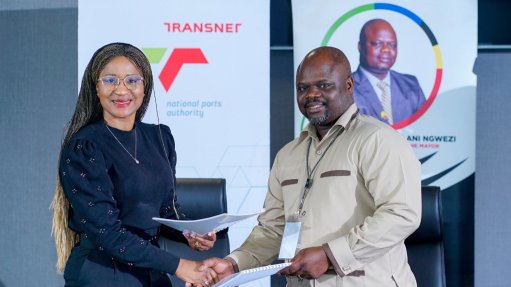Cape Town calls for reduced water use on the back of this year’s below-average rainfall
The City of Cape Town has set a proactive water saving target, based on this year’s below-average rainfall, until the next rainy season.
Despite there being no immediate cause for concern about water security in Cape Town, with dam levels currently at about 73%, the city is calling on residents and businesses to use water wisely and fix leaks, to collectively keep use below 950-million litres a day.
“If we use more than this target this summer, followed by another below-average rainfall next winter, the city may have to implement water restrictions by next summer,” says acting Mayoral Committee Member for Water and Sanitation Councillor Siseko Mbandezi.
“We believe this is the responsible step to take now – an early call for Cape Town to collectively work towards using less than a target amount of 950-million litres a day to reduce the risk of restrictions at a later stage.”
The wise use of water helps maintain the supply in instances of prolonged or heavy periods of loadshedding and when maintenance work is being done on bulk infrastructure.
The request followed a meeting among the City of Cape Town, other water users within the Western Cape Water Supply System (WCWSS) and the Department of Water and Sanitation (DWS), where the anticipated municipal and agricultural water use and the implications of the well-below-average rainfall this past winter was discussed.
It was agreed that no water restrictions will be implemented at this stage; however, a voluntary reduction of 10% from all WCWSS users was called for.
The requirement for water restrictions from the WCWSS is usually assessed after the end of the winter rainfall season at the end of October.
“Last summer, water use exceeded 1 000-million litres per day a few times during heat waves, and this took us back to the kind of use last seen before the drought crisis of the 2016 to 2018 period,” Mbandezi says.
“We are already seeing use starting to spike in recent weeks because of the warmer weather, rising well above the 900-million litres a day mark. We have journeyed together to save water before and we have no doubt that Cape Town will work together again to stay below the target.”
Water use and dam levels will be monitored closely, while the city’s Water and Sanitation Directorate will continue with its own efforts to reduce water waste by preventing or addressing burst pipes and leaks through its programmes such as leak detection, yearly pipe replacement and pressure management.
The city will also continue to implement its long-term New Water Programme that aims to bring 300-million litres of extra water a day on line by 2030 through a variety of sources, including desalination, water reuse and groundwater through aquifers.
“Diversifying our water sources will reduce the city’s current dependence on rain-fed dams as our main source of water. Over the next three financial years, the city will be investing about R2.05-billion in new water sources. The city has already invested R1.55-billion in this programme.”
Further, the City of Cape Town is contributing R50-million to a partnership coordinated by The Nature Conservancy that clears thirsty alien invasive plants to enable more water to reach the dams within the WCWSS.
Currently, more than 55-billion litres of water, equating to about two months of water supply for Cape Town, is lost each year, owing to invasive plants such as pine, gum, and wattle trees, which, if not dealt with, will double to 100-billion litres of water lost each year within the next 20 years.
“This is the most cost-effective supply intervention we have as part of the diverse mix of sources we are bringing on line,” Mbandezi says, pointing out that wise outdoor water use, fixing leaks and complying with permanent regulations are also key ways to save water.
He urges residents and businesses to check for and fix leaks on their property and familiarise themselves with permanent regulations governing water use for pools, gardening and vehicle cleaning, besides others.
These include fitting all hosepipes used for watering or washing vehicles, boats and caravans, when permitted, with a controlling device such as a spray nozzle or automatic self-closing device.
Watering is only allowed before 09:00 or after 18:00 and all swimming pools must be covered by a pool cover to avoid evaporation when not in use.
“Residents and businesses are reminded to be water wise at all times, and even more so in the hot summer months to come.
“When residents and businesses have the necessary information to monitor use, identify leaks and save water, they can make informed decisions to help prevent wasting water,” Mbandezi concludes.
Article Enquiry
Email Article
Save Article
Feedback
To advertise email advertising@creamermedia.co.za or click here
Comments
Press Office
Announcements
What's On
Subscribe to improve your user experience...
Option 1 (equivalent of R125 a month):
Receive a weekly copy of Creamer Media's Engineering News & Mining Weekly magazine
(print copy for those in South Africa and e-magazine for those outside of South Africa)
Receive daily email newsletters
Access to full search results
Access archive of magazine back copies
Access to Projects in Progress
Access to ONE Research Report of your choice in PDF format
Option 2 (equivalent of R375 a month):
All benefits from Option 1
PLUS
Access to Creamer Media's Research Channel Africa for ALL Research Reports, in PDF format, on various industrial and mining sectors
including Electricity; Water; Energy Transition; Hydrogen; Roads, Rail and Ports; Coal; Gold; Platinum; Battery Metals; etc.
Already a subscriber?
Forgotten your password?
Receive weekly copy of Creamer Media's Engineering News & Mining Weekly magazine (print copy for those in South Africa and e-magazine for those outside of South Africa)
➕
Recieve daily email newsletters
➕
Access to full search results
➕
Access archive of magazine back copies
➕
Access to Projects in Progress
➕
Access to ONE Research Report of your choice in PDF format
RESEARCH CHANNEL AFRICA
R4500 (equivalent of R375 a month)
SUBSCRIBEAll benefits from Option 1
➕
Access to Creamer Media's Research Channel Africa for ALL Research Reports on various industrial and mining sectors, in PDF format, including on:
Electricity
➕
Water
➕
Energy Transition
➕
Hydrogen
➕
Roads, Rail and Ports
➕
Coal
➕
Gold
➕
Platinum
➕
Battery Metals
➕
etc.
Receive all benefits from Option 1 or Option 2 delivered to numerous people at your company
➕
Multiple User names and Passwords for simultaneous log-ins
➕
Intranet integration access to all in your organisation


















